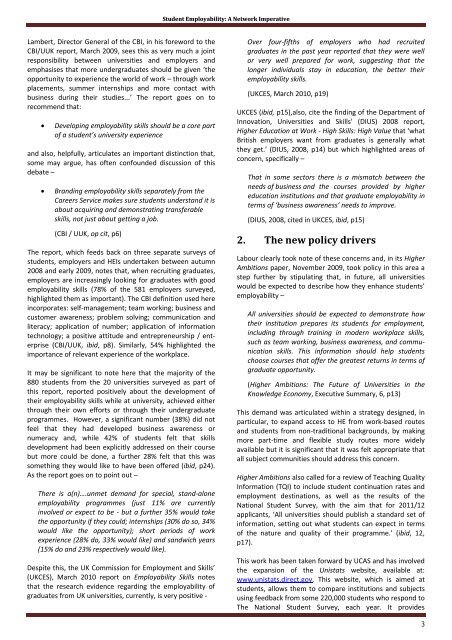Student Employability: A Network Imperative - Birkbeck, University of ...
Student Employability: A Network Imperative - Birkbeck, University of ...
Student Employability: A Network Imperative - Birkbeck, University of ...
Create successful ePaper yourself
Turn your PDF publications into a flip-book with our unique Google optimized e-Paper software.
<strong>Student</strong> <strong>Employability</strong>: A <strong>Network</strong> <strong>Imperative</strong><br />
Lambert, Director General <strong>of</strong> the CBI, in his foreword to the<br />
CBI/UUK report, March 2009, sees this as very much a joint<br />
responsibility between universities and employers and<br />
emphasises that more undergraduates should be given ‘the<br />
opportunity to experience the world <strong>of</strong> work – through work<br />
placements, summer internships and more contact with<br />
business during their studies...’ The report goes on to<br />
recommend that:<br />
• Developing employability skills should be a core part<br />
<strong>of</strong> a student’s university experience<br />
and also, helpfully, articulates an important distinction that,<br />
some may argue, has <strong>of</strong>ten confounded discussion <strong>of</strong> this<br />
debate –<br />
• Branding employability skills separately from the<br />
Careers Service makes sure students understand it is<br />
about acquiring and demonstrating transferable<br />
skills, not just about getting a job.<br />
(CBI / UUK, op cit, p6)<br />
The report, which feeds back on three separate surveys <strong>of</strong><br />
students, employers and HEIs undertaken between autumn<br />
2008 and early 2009, notes that, when recruiting graduates,<br />
employers are increasingly looking for graduates with good<br />
employability skills (78% <strong>of</strong> the 581 employers surveyed,<br />
highlighted them as important). The CBI definition used here<br />
incorporates: self‐management; team working; business and<br />
customer awareness; problem solving; communication and<br />
literacy; application <strong>of</strong> number; application <strong>of</strong> information<br />
technology; a positive attitude and entrepreneurship / enterprise<br />
(CBI/UUK, ibid, p8). Similarly, 54% highlighted the<br />
importance <strong>of</strong> relevant experience <strong>of</strong> the workplace.<br />
It may be significant to note here that the majority <strong>of</strong> the<br />
880 students from the 20 universities surveyed as part <strong>of</strong><br />
this report, reported positively about the development <strong>of</strong><br />
their employability skills while at university, achieved either<br />
through their own efforts or through their undergraduate<br />
programmes. However, a significant number (38%) did not<br />
feel that they had developed business awareness or<br />
numeracy and, while 42% <strong>of</strong> students felt that skills<br />
development had been explicitly addressed on their course<br />
but more could be done, a further 28% felt that this was<br />
something they would like to have been <strong>of</strong>fered (ibid, p24).<br />
As the report goes on to point out –<br />
There is a(n)….unmet demand for special, stand‐alone<br />
employability programmes (just 11% are currently<br />
involved or expect to be ‐ but a further 35% would take<br />
the opportunity if they could; internships (30% do so, 34%<br />
would like the opportunity); short periods <strong>of</strong> work<br />
experience (28% do, 33% would like) and sandwich years<br />
(15% do and 23% respectively would like).<br />
Despite this, the UK Commission for Employment and Skills’<br />
(UKCES), March 2010 report on <strong>Employability</strong> Skills notes<br />
that the research evidence regarding the employability <strong>of</strong><br />
graduates from UK universities, currently, is very positive ‐<br />
Over four‐fifths <strong>of</strong> employers who had recruited<br />
graduates in the past year reported that they were well<br />
or very well prepared for work, suggesting that the<br />
longer individuals stay in education, the better their<br />
employability skills.<br />
(UKCES, March 2010, p19)<br />
UKCES (ibid, p15),also, cite the finding <strong>of</strong> the Department <strong>of</strong><br />
Innovation, Universities and Skills' (DIUS) 2008 report,<br />
Higher Education at Work ‐ High Skills: High Value that ‘what<br />
British employers want from graduates is generally what<br />
they get.’ (DIUS, 2008, p14) but which highlighted areas <strong>of</strong><br />
concern, specifically –<br />
That in some sectors there is a mismatch between the<br />
needs <strong>of</strong> business and the courses provided by higher<br />
education institutions and that graduate employability in<br />
terms <strong>of</strong> ‘business awareness’ needs to improve.<br />
(DIUS, 2008, cited in UKCES, ibid, p15)<br />
2. The new policy drivers<br />
Labour clearly took note <strong>of</strong> these concerns and, in its Higher<br />
Ambitions paper, November 2009, took policy in this area a<br />
step further by stipulating that, in future, all universities<br />
would be expected to describe how they enhance students’<br />
employability –<br />
All universities should be expected to demonstrate how<br />
their institution prepares its students for employment,<br />
including through training in modern workplace skills,<br />
such as team working, business awareness, and communication<br />
skills. This information should help students<br />
choose courses that <strong>of</strong>fer the greatest returns in terms <strong>of</strong><br />
graduate opportunity.<br />
(Higher Ambitions: The Future <strong>of</strong> Universities in the<br />
Knowledge Economy, Executive Summary, 6, p13)<br />
This demand was articulated within a strategy designed, in<br />
particular, to expand access to HE from work‐based routes<br />
and students from non‐traditional backgrounds, by making<br />
more part‐time and flexible study routes more widely<br />
available but it is significant that it was felt appropriate that<br />
all subject communities should address this concern.<br />
Higher Ambitions also called for a review <strong>of</strong> Teaching Quality<br />
Information (TQI) to include student continuation rates and<br />
employment destinations, as well as the results <strong>of</strong> the<br />
National <strong>Student</strong> Survey, with the aim that for 2011/12<br />
applicants, ‘All universities should publish a standard set <strong>of</strong><br />
information, setting out what students can expect in terms<br />
<strong>of</strong> the nature and quality <strong>of</strong> their programme.’ (ibid, 12,<br />
p17).<br />
This work has been taken forward by UCAS and has involved<br />
the expansion <strong>of</strong> the Unistats website, available at:<br />
www.unistats.direct.gov. This website, which is aimed at<br />
students, allows them to compare institutions and subjects<br />
using feedback from some 220,000 students who respond to<br />
The National <strong>Student</strong> Survey, each year. It provides<br />
3

















